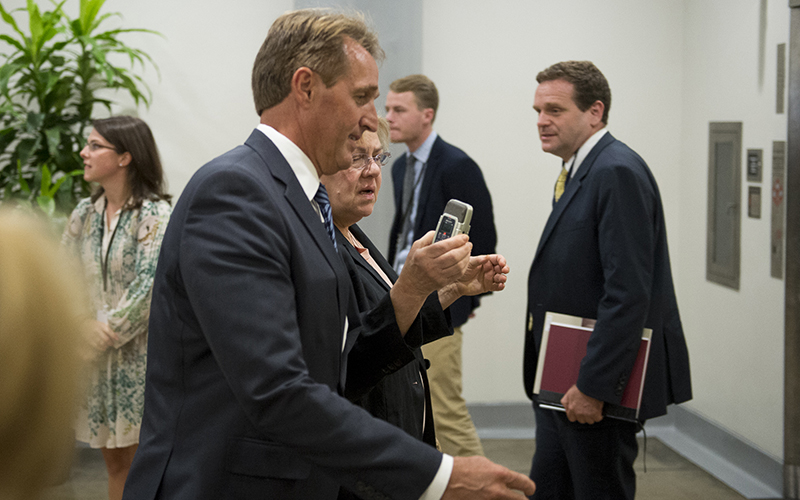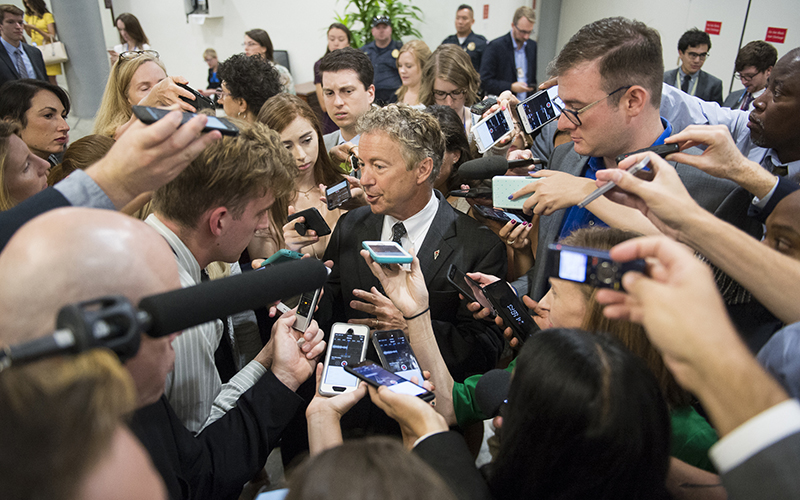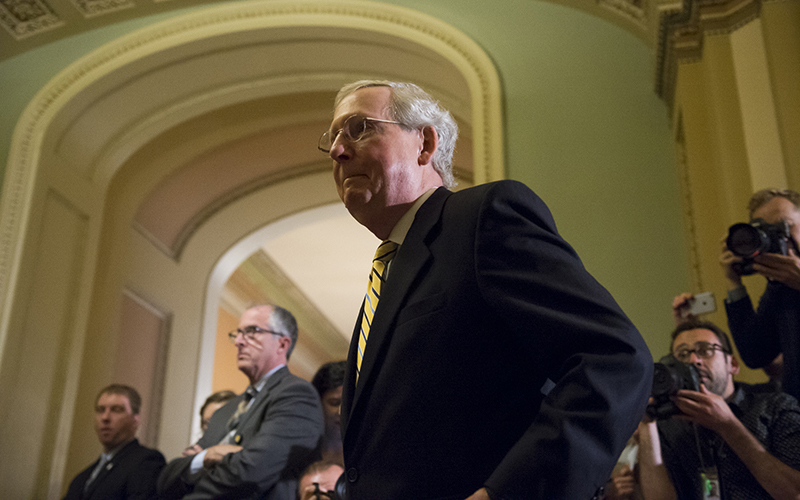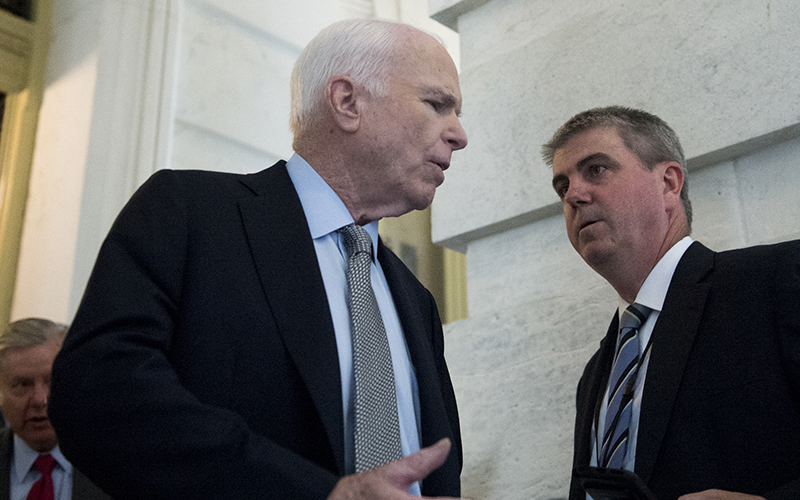
Sen. Jeff Flake, R-Arizona, said that he voted to move forward on debate on health care reform in hopes of starting an “open, transparent and thorough debate” on a replacement for Obamacare. (Photo by Ben Moffat/Cronkite News)

Reporters mob Sen. Rand Paul, R-Kentucky, in a scene tyipcal in the Capitol on Tuesday. Paul, long an opponent of the Obamacare replacement measures, voted to proceed with debate. (Photo by Ben Moffat/Cronkite News)

Senate Majority Leader Mitch McConnell, R-Kentucky, has been working for weeks to find a repeal and replacement plan for the Affordable Care Act that will appeal to both wings of his party. (Photo by Ben Moffat/Cronkite News)

Sen. John McCain, R-Arizona, voted to let debate proceed on plans to repeal or replace Obamacare. But McCain said he could not vote for any current bills without heavy amendment. (Photo by Ben Moffat/Cronkite News)
WASHINGTON – Both Arizona senators joined the majority of their fellow Republicans and voted by the narrowest possible margin Tuesday to allow debate on measures that could repeal or replace the Affordable Care Act.
The 51-50 vote marked the emotional return of Sen. John McCain, R-Arizona, who said he could not vote for the “shell of a bill” before the Senate, but that he wanted debate to move forward.
McCain, diagnosed last week with an aggressive form of brain cancer, reminded senators of their responsibility to work together, something he said did not happen when Democrats passed Obamacare or when Republicans tried to replace it.
“Merely preventing your political opponents from doing what they want isn’t the most inspiring work,” McCain said to his fellow senators. “There’s greater satisfaction in respecting our differences, but not letting them prevent agreements that don’t require abandonment of core principles, agreements made in good faith that help improve lives and protect the American people.”
McCain said he had amendments proposed by Arizona Gov. Doug Ducey “that will have to be included for my support of final passage of any bill.”
See related story:
McCain cajoles, condemns, coerces Senate in emotional return
Ducey’s office did not return requests for comment Tuesday. But he has expressed concern in the past about the cost states would have to bear – the Arizona Health Care Cost Containment System estimated that previous versions of the bill could cost the state up to $7.1 billion over 10 years – and the possible loss of coverage to hundreds of thousands of Arizonans.
The Senate vote came just hours after mayors of Phoenix and Mesa joined others on a conference call urging Congress to take a step back and “start from scratch” on health care reform.
Phoenix Mayor Greg Stanton, a Democrat, said the current House and Senate proposals “would be a disaster for our state,” leaving thousands uninsured. Mesa Mayor John Giles, a Republican, said he agreed that the ACA, better known as Obamacare, is flawed.
“I think that everyone agrees that we want to improve it, but the way to fix something is not to make it worse,” Giles said Tuesday. “And I’m afraid that’s the options being debated right now in Washington, D.C.”
Tuesday’s Senate vote follows weeks of wrangling by Senate Republicans trying to craft a bill that pleases both wings of the party. They can only afford to lose a few GOP votes in the face of Democratic opposition, with all 48 Democrats in the Senate uniformly opposed to the Republicans’ repeal or replacement bills.
The Congressional Budget Office estimated that a bill passed by the House in May could cost 23 million people their health coverage by 2026, while reducing the federal deficit by $119 billion. A proposed Senate bill would have pushed 22 million people off health coverage and it would have cut the deficit by $321 billion, according to the CBO.
That bill was pulled when Republican leaders in the Senate realized they did not have the votes for it. In its place, they offered a bill to repeal the ACA, better known as Obamacare, that passed in 2015 but was vetoed by then-President Barack Obama.
But that plan ran into opposition when the CBO reported that repeal without replacement could cost 32 million Americans their coverage, while reducing the federal deficit by $473 billion.
That led to Tuesday’s procedural vote to allow debate to proceed on the House version of the bill. It needed only a simple majority, but Vice President Mike Pence had to vote to break a 50-50 tie after Republican Sens. Lisa Murkowski of Alaska and Susan Collins of Maine voted no.
Sen. Jeff Flake, R-Arizona, like many who voted yes Tuesday, said he supported the motion because it will allow for “an open, transparent, and thorough debate process to best deal with repealing Obamacare.”
“Obamacare is failing and I look forward to considering various solutions to ensure Arizonans have access to affordable, quality health care,” Flake said in a statement released by his office.
Giles last week, after the failure of a previous Senate bill, called on Senate leaders to change their approach when drafting the next proposals, saying it “should be done in an inclusive, open manner.”
“I hope that Sens. McCain and Flake and their colleagues will take mayors up on our offer to partner to craft bipartisan legislation that meets the needs of cities and towns across Arizona,” Giles said then.